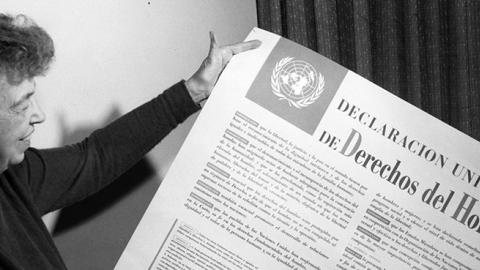p(firstLetter). Since 2007 I have interviewed scores of Americans and foreign nationals—diplomats, embassy staff, soldiers, journalists, NGO workers, missionaries, business people, and others—who have represented the United States overseas. Some of these interviews were about U.S. government efforts to support independent journalism in places where it would not otherwise exist. Others concerned how the export of American film, TV shows, and popular music, which increased fourfold between 1989 and 2010, often distort foreign perceptions of American society and institutions.
Most of these interlocutors felt a strong need to push back against a narrative of the United States as a cesspool of hedonism, dysfunction, criminality, and corruption, which they saw as being aggressively purveyed not only by the hostile propaganda of our adversaries but also, ironically, by the more lurid productions of our entertainment industry. And there was general agreement that the most effective way to push back is not censorship (there is already too much of that in the world) but honest, vigorous counter-speech affirming what is best about America.
But that raises a question: What is best about America? To our educated elites, the answer is obvious: America’s greatest virtue, the thing that makes this nation a shining city upon a hill, is diversity. By the same logic, our elites tend to assume that the main threats to freedom and democracy emanate not from hostile foreign powers but from domestic prejudices such as racism, sexism, and homophobia. The next step is to urge well-meaning Americans to bear the glad tidings of diversity to every backward corner of the globe.
This answer is not wrong. Even in the age of Trump, foreign visitors continue to marvel at the easy mingling of colors, creeds, and backgrounds in public and private settings all across America. But by the same token, what American elites mean by diversity goes beyond mere mingling to the point of requiring people to “celebrate difference.” The trouble here is that, by itself, diversity is not a virtue. It is simply a fact, a ground-level reality that, boosted by record levels of migration, is becoming increasingly obtrusive in many places besides America. To put it another way: When those same foreign visitors return home and find large numbers of strangers in their midst, their admiration for diversity may well diminish.
If America can no longer count on being the shining city of diversity, then what other virtues can we claim? For an answer I turn again to my overseas interlocutors. On several occasions, the more thoughtful ones volunteered their description of the type of American most admired in the parts of the world they knew best. The picture was remarkably consistent: an unpretentious man or woman who takes a hopeful but practical approach to solving problems.
By “hopeful” my interlocutors did not mean utopian dreams of saving the world. Indeed, they made clear their disdain for the American tendency to pursue overly ambitious goals in a starry-eyed way, not to mention in the short term and on the cheap. This tendency dates back to the post-millennial project of 19th-century American Protestantism, which was to perfect America as a Christian nation, then go forth as missionaries to perfect all the other nations, in anticipation of the Day of Judgment. In the 20th century this project took secular form as the “religion of progress” by which America would provide the template for a modernizing, democratizing world. Intoxicated by this spirit, Americans have done amazing things. But we have also done terrible things. And more often, we have failed to do the good things we set out to do.
That is why my interlocutors stressed the word “practical”: They were mindful of the need to temper optimism with a prudent awareness of limits, both material and (more important) human. Rather than dream of a future in which the crooked timber of humanity will be straightened out once and for all, this distinctive and widely admired American ethos seeks to build with the material at hand—namely, the frailty and waywardness of men and women as they actually exist.
p(firstLetter). This ethos lies at the heart of the current American critique of the Universal Declaration of Human Rights (UDHR), adopted by the UN General Assembly in December 1948 and now approaching its 70th anniversary. This critique is not new, because, to quote the veteran human rights activist Aaron Rhodes, the UDHR “mingled human rights based on natural law with positive rights granted by states—rights that emerged from specific political traditions.” As elaborated in his new book, The Debasement of Human Rights (Encounter, 2018), Rhodes and his fellow critics consider the UDHR a deal with the devil that “aggrandized positive economic and social rights as human rights intrinsic to human beings, while degrading natural rights as nothing more than arbitrary gifts of the state.”1
It can be bracing to read a passionate critique: The right sort of polemic can stir our mental sediment and remind us of the deeper reasons why we hold to a particular position. I suspect Rhodes meant to write such a polemic—and as the former executive director of the International Helsinki Federation for Human Rights during the critical years of conflict in the Balkans, Chechnya, and Central Asia, a co-founder of the Hamburg-based Freedom Rights Project, and the current president of the Vienna-based Forum for Religious Freedom-Europe, he seems the right man for the job.
But unfortunately, The Debasement of Human Rights is more enervating than bracing. In the first instance, it is poorly organized. Rhodes has a wealth of practical experience to draw upon—as he notes in the Introduction, “I have come to my conclusions about the nature of human rights through many years of working in the trenches, in both advocacy and investigation.”2 But while some of this evidence appears in later chapters, it is preceded by a great deal of repetitive rhetoric about how the natural political and civil rights enshrined in the U.S. Constitution are based on the bedrock of objective truth and the will of God; and the positive economic, social, and cultural rights enumerated in the UDHR are based on the shifting sands of politics and the arbitrary will of dictators.
However worthwhile this point, it is tedious to see it belabored on every page. And it is exceedingly counter-productive of Rhodes to ramp up the rhetoric for the sake of relieving that tedium, as he does in a passage intimating that FDR’s 1944 State of the Union address urging the continuation of the New Deal’s social safety net “stood in stark contrast” to the Enlightenment view of “humans as independent individuals with the capacity for moral choice,” and “might even be seen as providing an exculpation” for “the horrific crimes of the Nazis.”3
Less egregious but equally regrettable is Rhodes’s effort to establish a rock-solid basis for natural rights as articulated in the Declaration of Independence and the First Amendment. To this end, he summons the spirits of Socrates, Zeno, Cicero, John Locke, the Magna Carta, the French Declaration of the Rights of Man and of the Citizen, Aristotle, the Hebrew Bible, and Immanuel Kant. In the hands of a deeply learned and astute political theorist, these sources could conceivably be woven into a coherent, if not dispositive, account of why natural rights should take priority over positive rights. But Rhodes offers no such account. Instead, he cherry-picks these sources for a sermon addressed exclusively to the choir.
Rhodes can be eloquent in affirming the ways in which political and civil liberties are fundamental to the “cultivation and preservation of the human soul” in a world full of dehumanizing threats, not only from undemocratic “states and ideologies” but also from “the complacency and moral lassitude, and indeed the illiberalism of many members of liberal democracies.”4 And he is right to emphasize that the UDHR was drafted by a committee that included both champions of liberal democracy and advocates of democratic—and undemocratic—socialism.
But Rhodes is wrong to impugn that committee, and indeed all defenders of social welfare systems past and present, as authoritarian wolves in democratic sheep’s clothing. Rhodes is right to complain that the UDHR has been roundly abused over the last 70 years. But what is the counterfactual? As the legal scholar Mary Ann Glendon observes:
It is worth remembering that the men and women who built those principles into the human rights project were not starry-eyed idealists. Nearly all of them had lived through two world wars and severe economic crises. The events of their times had shown them human beings at their best and worst. They took encouragement from the fact that while the human race is capable of gross violations of human rights, it is also capable of imagining that there are rights to violate, of articulating those rights in declarations and constitutions, of orienting their conduct toward the norms they have recognized, and feeling the need to make excuses when their conduct falls short.5
In A World Made New, Glendon’s 2001 history of the drafting of the UDHR, she makes a strong case for the “organic unity” of that document, which had a clear structure built on a foundation of human “dignity, liberty, equality, and brotherhood”; and an equally clear design that prioritized individual rights to “life, liberty, and personal security” over “rights in civil society”; “rights in the polity”; and “economic, social, & cultural rights.” Glendon faults the document’s many critics for ignoring this structure, and she reminds us that “The ink was barely dry on the UDHR when the Cold War antagonists disregarded the fact that it was an integrated document composed of mutually conditioning parts. They tore it in half, so to speak, with the US championing the political and civil rights, the Soviet Union emphasizing its social and economic provisions, and both ignoring the rest of the text.”6
Words to remember in a world intent upon shredding this and every other document affirming human freedom. One thing is clear: The fact that these documents were all created by particular people in particular places and times is not grounds for disparaging them. The same is true of the American ethos. It, too, was woven from different religious, philosophical, and economic strands: dissenting Protestantism, with its contending visions of whether or not the soul can actively seek salvation; Enlightenment liberalism, with its relatively sunny view of human beings as naturally rational and free; classical republicanism, with its darker warning that self-government is not possible without citizen virtue; and the defense of the free market by Adam Smith, a moral philosopher who also took a fairly dim view of human nature, a fact sometimes lost on his libertarian acolytes. (As the economist Herb Stein wrote back in 1994, “Adam Smith did not wear an Adam Smith necktie.”)
Because the American ethos emerged from these particular roots, it is easy for its enemies to dismiss it as a mere artifact of culture—and to suggest that it pales by comparison with various authoritarian ideologies, for example the Confucian tradition as weaponized by the Chinese Communist Party. But unlike those other ideologies, the American ethos is beneficial to all human beings, not because it is American but because it opens a path between two extremes: the naive optimism that so often begins our striving for a better world, and the cynical pessimism that so often ends it.

















